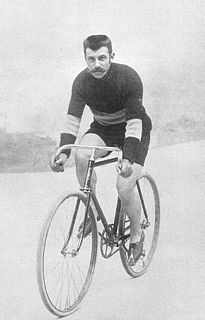Mathieu Cordang

|
|
| Mathieu Cordang (1910) | |
| To person | |
|---|---|
| Nickname | Recordang |
| Date of birth | December 6, 1869 |
| date of death | March 24, 1942 |
| nation |
|
| discipline | Railway (endurance) / road |
| Last updated: December 28, 2016 | |
Joannes Matheus "Mathieu" Cordang (born December 6, 1869 in Blerick , † March 24, 1942 in Swalmen ) was a Dutch cyclist .
biography
Athletic career
Mathieu Cordang was one of the Dutch cycling pioneers together with Jaap Eden . He came from a poor background and was the ninth of 15 siblings. So he went to sea early. In 1893 he attended a race in Vlissingen while he was in port . Without further ado, he borrowed a bike, took part, won and then decided to become a racing driver. On September 15, 1893 he became a member of the Algemene Nederlandsche Wielrijders-Bond . He also opened a bicycle shop.
Cordang celebrated his first major victory in 1894 when he made his debut as a cyclist at the local classic Amsterdam-Arnhem-Amsterdam , twelve minutes ahead of the cycling star Kees Witteveen , who was to become his permanent rival. Together with Chris Bailleux he became world champion in tandem races . He became a specialist in standing races and long distances on the track . For his participation in the Paris-Brest-Paris and Bordeaux-Paris races , he received 60,000 francs from the bicycle manufacturer Gladiator . In 1895 he became world champion of the amateurs in Cologne (before compatriot Witteveen). Then he turned professional , which the Dutch were only allowed to do this year.
In 1897 Cordang took second place in the races Paris-Roubaix (behind the eventual winner of the first Tour de France , Maurice Garin ) and Bordeaux-Paris behind Gaston Rivierre . He went to London , where he achieved the greatest achievement of his career: On September 18, 1897, he drove behind pacemakers for 24 hours and broke all world records that had existed until then. He drove a total of 991 kilometers and 651 meters. When he returned to the Netherlands, he was celebrated and nicknamed Recordang . He himself broke this 24-hour world record in The Hague in September 1899 with 1030 kilometers and 110 meters. He also drove a race against a railroad, which he won even though the railroad was two kilometers shorter. In 1900 he won the Bol d'Or 24-hour race .
At the 1900 Olympic Games in Paris , Cordang won a gold medal in the 24-hour race behind (non-motorized, multi-seat) pacemaker machines. However, this competition is not officially recognized. In the same year he won the Bol d'Or des Monédières Chaumeil before Garin and the German Thaddäus Robl . Cordang, a chain smoker with a penchant for cigars, alcohol, and food, took this victory as an opportunity to step down.
After the sport
A few months after his resignation, Cordang's home in Blerick went up in flames with his entire trophy collection. He then moved to Swalmen , his wife's hometown, where he first opened a bike shop and later a car repair shop. He also took part in car races. He became the father of eight children, whom he forbade to become cyclists. In 1942 the Germans confiscated all of Cordang's cars and engines and he had to close his shop. A little later Mathieu Cordang died of pneumonia.
Honors
In Almere the Cordangpad was named after him.
In August 2018, Mathieu Cordang Park was named after him in Swalmen and a monument to him was unveiled there.
literature
- Wim van Eyl: Een eeuw Nederlandse wielersport. Van Jaap Eden dead Joop Zoetemelk , Utrecht 1980.
- Theo Stevens: “The Short and Remarkable Career of Mathieu Cordang (1869–1942).” In: Cycle History 10th Proceedings, 10th International Cycling History Conference Nijmegen 1999 . Edited by Prof. Dr. Hans-Erhard Lessing and Andrew Ritchie. Pp. 90-97.
Web links
- Mathieu Cordang in the Radsportseiten.net database
- Sportgeschiedenis.nl: "Vergeten Sporthelden: Mathieu Cordang" ( Memento from August 2, 2016 in the Internet Archive )
- Theo Stevens: "Breed & Stoer". In: De Sportwereld . January 1999 ( Memento from August 8, 2016 in the Internet Archive ) (PDF file; 5.04 MB)
Individual evidence
- ↑ Stevens, The Short and Remarkable Career of Mathieu Cordang , 29. Some sources is 26 . December noted as the date of birth. The scientific source of Stevens is with reference to the municipal archives Venlo to 6 . December on. This date can also be found on the monument to Cordang in Swalmen.
- ↑ a b c d e Frans Oudejans: Cordang, Joannes Matheus (1869-1942). Biographical Woordenboek van Nederland, November 12, 2013, accessed December 28, 2016 .
- ↑ Benjo Maso : The Sweat of the Gods. The history of cycling . Covadonga Verlag , Bielefeld 2011, ISBN 978-3-936973-60-0 , p. 23 .
- ↑ Volker Kluge : Olympic Summer Games. Die Chronik I , Berlin 1997, p. 73.
- ^ Monument en park voor Mathieu Cordang. In: Stichting de Sportwereld. August 31, 2018, accessed April 10, 2019 (Dutch).
| personal data | |
|---|---|
| SURNAME | Cordang, Mathieu |
| ALTERNATIVE NAMES | Cordang, Joannes Matheus |
| BRIEF DESCRIPTION | Dutch cyclist |
| DATE OF BIRTH | December 6, 1869 |
| PLACE OF BIRTH | Blerick |
| DATE OF DEATH | March 24, 1942 |
| Place of death | Swalms |
